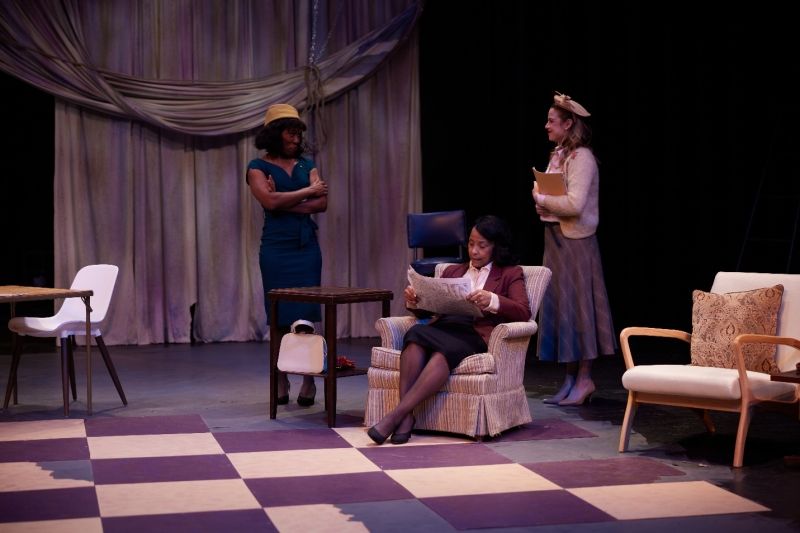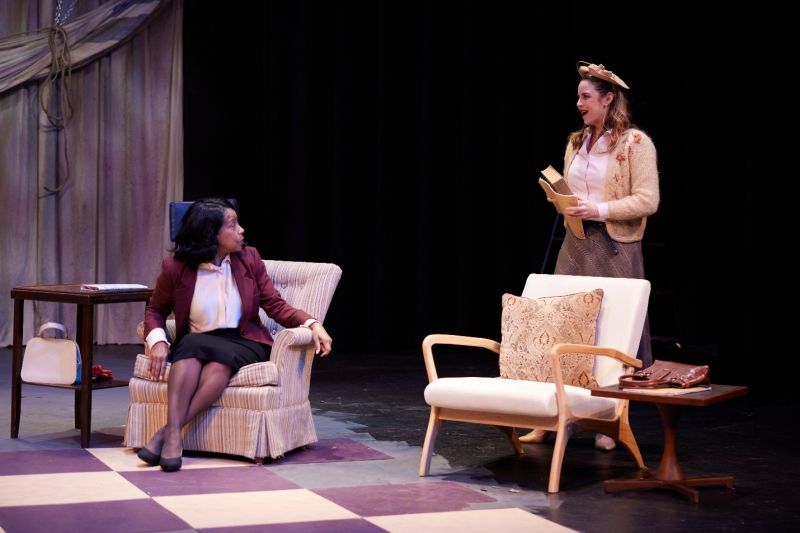Review: TROUBLE IN MIND at Kansas City Actors Theatre
A Funny Play with a Point.

 It is funny. It is a slice of life. It is a literal peek behind the curtain. Kansas City Actors Theatre production of Alice Childress’s TROUBLE IN MIND allows audiences a long-delayed opportunity to vision America (and its theatrical community) as it appeared in 1955 from an African American point of view. I was struck by how much our country has matured (mostly) for the better) over eighty years.
It is funny. It is a slice of life. It is a literal peek behind the curtain. Kansas City Actors Theatre production of Alice Childress’s TROUBLE IN MIND allows audiences a long-delayed opportunity to vision America (and its theatrical community) as it appeared in 1955 from an African American point of view. I was struck by how much our country has matured (mostly) for the better) over eighty years.

TROUBLE IN MIND was written by black playwright Alice Childress in 1955. Childress had already enjoyed significant successful experience as an actor and become a leading figure in civil rights activities of the 1950s and 1960s. The fact that Childress happened to have been a black woman is important only because she was a trailblazer.
Childress’ play was first produced at New York’s Greenwich Mews 200 seat theater According to Roundabout Theatre, Greenwich Mews Theatre (inside the Village Presbyterian Church) was then led by a Polish Émigré named Stella Holt. Many significant plays were staged in the tiny space; especially plays by black writers. Many casts were either integrated or all black. Ms. Holt required colorblind casting. She herself had lost her ability to see at age seventeen.

TROUBLE IN MIND is the story of a play with a mixed race cast in early rehearsals. The play being rehearsed is called CHAOS IN BELLEVIEW written by an unnamed, but well-meaning white playwright and directed by a well-meaning white man named Al Manners (John Rensenhouse).
The intent of CHAOS IN BELLEVIEW (we suppose) is to expose maltreatment and racism still occurring in the 1950s. We gather the main plot of “CHAOS” concerns an accusation about voting made against a young black man and a mob’s intention to lynch him.
The existence of CHAOS IN BELLEVIEW is the reason for this rehearsal. TROUBLE IN MIND, our play, is mostly framed as a comedy but with a social point. Director Manners (Rensenhouse) sees himself as a creative person trying to do a good thing. He does understand that he is also a representative of a business enterprise. Our cast is mostly, but not exclusively black.
Let me set the scene.
Ten years have passed since the conclusion of World War II. Dwight Eisenhower is President of the United States. A large plurality (sixty-eight percent) of women are stay-at- home Moms whose job it is to manage the household.
 Wiletta Mayer (Lynn King) enters the theater through its stage entrance. The white backstage guy named Henry (Scott Cordes) greets her and reminds her they have previously worked together.
Wiletta Mayer (Lynn King) enters the theater through its stage entrance. The white backstage guy named Henry (Scott Cordes) greets her and reminds her they have previously worked together.
Wiletta is a handsome back woman in her forties. She has come up in show business the hard way. She has no formal acting training. Wiletta has earned her starring role by hard work in the tank towns and vaudeville houses. In the process, Wiletta develops something of a chip on her shoulder. She and the director Al Manners have a history of working successfully together.
The players slowly assemble.
Wiletta is soon joined by Robert E. Coppage III as John Nevins. John Nevins is a young black actor on his first job after studying at Yale University. Enter young Judy Sears (Emmy Panzica-Piontak). Judy is a young white ingenue type in her first show. She is from the suburbs and attempting to prove to her folks she can do well in the theater.
Wiletta is the old pro who wants to show the new kids the ropes and how to gain control over their limited power.
Millie Davis (Chioma Anyanwu) is Wiletta’s friend from previous productions together as is Sheldon Forrester (Brad Shaw) cast in this show as Wiletta’s husband. Both Millie and Sheldon are working actors who cooperate with the system they have willingly joined.

It seems somehow that Wiletta and Al constantly butt heads. Al wants to work using the Stanislaus method, then popular among progressives. Wiletta is offended that she must read dialog written by a white man about a black community. Director Manners tells us that changing the script in the way Wiletta suggests is beyond his power to do.
This turns a funny play with something subtle to say into an ugly confrontation between the director and the star. The remainder of the mostly black cast attempts to smooth things over. Wiletta will have none of it.
Director Al stalks off before totally losing his cool and calls for rehearsals to restart tomorrow. The cast drifts off to a nearby eatery. Wiletta pushes aside their offer to join.
The play ends with Wiletta reciting a psalm by which she can claim a moral victory.
The remainder of the action occurs off-stage. TROUBLE IN MIND got pretty good reviews from both critics and audiences in 1955. The play was optioned to transfer to a Broadway theater.
At the time, a black female had yet to have had a Broadway production of their work. The producer, who happened to be a white man, thought the ending of the show was too melancholy and ambiguous. He asked that the Act II finale be softened for the audience. The New York Times Review agreed.
“Ms. Childress...has some witty and penetrating things to say...But it is all done with good humor and, except for the last ten or fifteen minutes, manages to avoid any impassioned sermonizing.”
 Ms. Childress reluctantly attempted to rewrite the ending for some two years before negotiations broke down and the project was shelved. A black female playwright broke through four years later in 1959. Ms. Childress determined to stand her ground and never let a producer have input into her plays again. Alice Childress died in 1994.
Ms. Childress reluctantly attempted to rewrite the ending for some two years before negotiations broke down and the project was shelved. A black female playwright broke through four years later in 1959. Ms. Childress determined to stand her ground and never let a producer have input into her plays again. Alice Childress died in 1994.
KCAT’s production of TROUBLE IN MIND is well cast and most cast members have pretty good comic timing. Unfortunately, because they know what is coming, I’m not sure the show is either as biting or as funny as it might have been otherwise.
John Rensenhouse is a big presence onstage. His boomer of a voice tends to overwhelm everything else on stage with him. His closing speech explains a different point of view from playwright Childress.
Lynn King is a fine actress, but the relative strengths of director Manners instrument to star Wiletta’s instrument tends to reinforce the ambiguousness of the ending. I cannot believe that this is what Alice Childress intended.
I do not know who the original producer was to have been. His challenge was different from the playwright. She wanted to make a point important to her. The producer wanted to put butts in four times as many seats as Mews Theatre had for as long as possible.
Early in Act 1, young John Nevins basks in the glow of being part of the theater. Wiletta responds. “Colored folks ain’t in no theater,” she says. “They are merely in a business.” Yeah! Everyone is in show business. The quality of the performance determines pretty much how long you can continue doing what you love doing.
TROUBLE IN MIND lay fallow moldering away in some drawer until it was revived at the American Airlines Theater in November 2021. It ran for twenty previews and fifty-eight performances. It was nominated for four Tony Awards.
Perhaps Alice Childress was completely right. She may have ended up being the model for her own leading character. Could she have created more viewership and accomplished more change using a slightly more subtle approach?
Other audience members may have a different take on what they see. As an admitted old white guy, I may be forgiven as the audience member who proves Ms. Childress’ point.
TROUBLE IN MIND is co-directed by Darren Sextro and Teisha Bankston. Costumes are designed by Matt Snellgrove. The play continues at City Stage on the lower level of Union Station through August 25. Tickets are available at www.kcactors.org or by telephone at 816.361.5228.
Photos are by Brian Paulette
Reader Reviews
Videos

